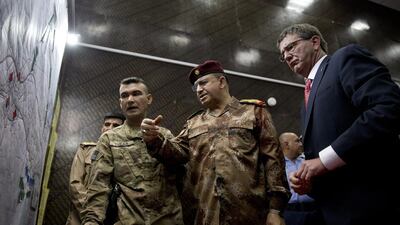BAGHDAD // Pentagon chief Ashton Carter held talks in Baghdad on Thursday on Iraq’s war against ISIL, whose “caliphate” is shrinking but is increasing its frequency of deadly car bombings.
His visit came as Iraqi troops, some of which were trained by the United States, tightened the noose on ISIL in Ramadi, the capital of Anbar province that the government lost in May.
On his first visit since taking office as defence secretary earlier this year, Mr Carter met Iraq prime minister Haider Al Abadi and some of the 3,500 US troops being deployed in the country.
Iraqi forces are being bolstered in their efforts to recapture the key city of Ramadi from ISIL by US-trained troops.
Mr Carter was briefed on the effect of the US training mission on a stalled Iraqi offensive to retake the city, which fell to militants in May.
He also met top Sunni politicians, including the parliament speaker, Salim Al Juburi, and officials from Anbar and Nineveh, the two regions where ISIL has its largest footprint.
Any attempt to take back Mosul, the capital of Nineveh and the largest city in the caliphate that ISIL proclaimed over parts of Iraq and Syria last year, has been put on hold.
The Iraqi government has instead focused on Anbar, a vast western province that stretches from the country’s borders with Syria, Saudi Arabia and Jordan, all the way to the outskirts of Baghdad.
Coalition aircraft, which have carried out thousands of airstrikes in Iraq and Syria during the past year, have lately been hitting dozens of targets in Anbar every week.
“Iraqi security forces are in the process of encircling” Ramadi, said Pentagon spokesman Col Steve Warren who is travelling with Mr Carter.
He put the number of militant fighters defending the city at 1,000 to 2,000.
He would not say when he thought a drive to wrest the city back from ISIL might be launched in earnest, but said it should be a matter of “weeks”.
US military advisers have trained 9,000 Iraqi soldiers since their deployment but they had never seen front-line action until a first batch of 3,000 troops recently joined the Ramadi battle, Mr Warren said.
“This is a development we are very satisfied to hear,” he said in Baghdad.
Several hundred US troops are also helping Iraqi forces train local Sunni Arab tribesmen at Habbaniyah, a large base situated between Ramadi and the militants’ other Anbar bastion of Fallujah.
Mr Warren said 1,800 tribal fighters had already received training and equipment under the programme.
But Anbar tribal leaders want more from Washington.
“The coalition’s support to Anbar and its sheikhs is weak on all levels, mainly the humanitarian level and the security level when it come to support for the tribes in liberating their areas,” said Rafia Al Fahdawi, a tribal leader whose forces have been fighting alongside the government.
Baghdad’s other main partner in the fight against the ISIL is Tehran, which also has advisers on the ground and directly supports the powerful Shiite militias now playing a lead role in the military effort.
Iran is not part of the coalition, and while this month’s historic nuclear deal opened a new chapter in relations between Tehran and Washington, their coexistence on Iraq’s battlefield continues to remain uneasy.
The Iraqi army, backed by Washington, wants to take back Ramadi first.
The Hashed Al Shaabi, an umbrella organisation for Tehran-backed groups that Mr Al Abadi only nominally controls, however, has made Fallujah its priority.
After initially expanding after its proclamation of a caliphate over parts of Iraq and Syria last summer, the group led by Abu Bakr Al Baghdadi, has witnessed the internationally supported Iraqi fightback roll back its borders.
The militants are also under pressure in Syria, where they have lost several key areas along the border with Turkey.
Observers have warned that as military pressure on ISIL mounted in the battlefield, the group risked reverting to its old tactics of hit-and-run attacks and car bombs.
The group claimed one of the biggest suicide car bomb attacks in Iraq’s bloody history last week when about 120 people were killed by a blast that ripped through a market in the town of Khan Bani Saad, just north of Baghdad.
The town is located in Diyala province, which has a border with Iran.
In January, the government announced it had “liberated” the town but it has since struggled to restore stability there.
The militants have also carried out a spate of car bomb attacks in the capital, the latest of which came on Wednesday evening.
ISIL issued a statement on an online militant forum yesterday that claimed responsibility for the two bombs that exploded in predominantly Shiite neighbourhoods.
The blasts killed at least 21 people.
Two other car bombs killed at least 23 people in Baghdad on Tuesday.
* Agence France-Presse
and Bloomberg News

